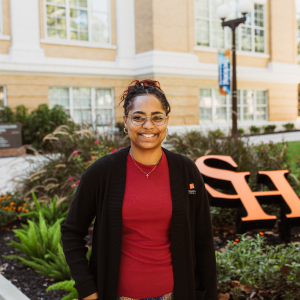Information for Families

Información Para la Familia en Español
Here at Sam Houston we want to ensure that the study abroad experience is enjoyed by both the student and their families. Family and friends play an important part in the student's study abroad process, from deciding on a program, to support while abroad, to adjusting to life at home after the program. We hope the information gathered here will give you an overview of what you can expect sending your student abroad and answer most of your questions.
There is no such thing as "the best" or "one-size-fits-all" study abroad experience. Your student's goal should be to find the best program for them. This will depend on a number of academic, personal, and financial factors. Here are some questions for your student to ask as they look for the program that best fits their own unique goals, objectives, and needs.
- How long is the program, and when is it offered?
- Is it a semester? A year? Shorter? Does it dovetail with SHSU's academic calendar and/or the student's need to work?
- What kind of program is this? Will I be traveling and studying together with a group of other students from SHSU, or a group of American students from other universities? Will I be "immersed" into a foreign university? What kind of support services will be available to me on-site?
The good news is that there are so many types of study abroad opportunities now available, with good planning, it is possible to find the right experience for almost any student. The SHSU Global Engagement Center is here to help your student find the right program for them.
"The Study Abroad Decision" is a great resource for students and families on the reasons to study abroad, the best ways to plan and experience your trip, and the trends behind today's popular abroad programs.
A Parent Guide to Study Abroad by IIE is a guide packed with practical information written specifically for parents. The authors make a strong case for the importance of parental involvement that can influence and shape a successful cross-cultural experience. Available for download in English and Spanish for free.
FAQ
- Why should my student study abroad?
- Getting a college education is about so much more than just earning a degree. A well-balanced education also includes knowledge and understanding of the world and learning how to become a contributing global citizen. Study abroad allows students to grow and learn in ways not possible in a classroom. Students gain cultural, historical and geographical knowledge through their experiences abroad, and they begin to look at themselves and the world differently. In addition, study abroad provides students with the opportunity to better understand, evaluate, and appreciate their own culture and values. Through study abroad, students can:
- Increase their career prospects and job marketability
- Develop leadership skills through interaction with a broad array of individuals
- Enhance academic focus and research opportunities
- Improve their foreign language proficiency
- Increase their understanding of other people and cultures
- Learn to navigate different environments
- Gain independence and self-reliance
- Is financial aid available for study abroad?
- In most cases students are able to use at least some of the same financial aid packages they receive at SHSU for study abroad. SHSU offers special scholarship money specifically designed to help make study abroad possible. The Study Abroad Coordinator can help direct students toward available resources for funding study abroad and let them know which programs will be eligible for financial aid.
- Are provisions made, or support services available, for students with special needs?
- If your student has special needs, they will want to ask questions about any special services, accommodations, etc. they may require or be accustomed to receiving on their home campus.
- Many countries have provisions comparable but not necessarily equal to those provided by the Americans with Disabilities Act (ADA); often they are not as extensive and generous as those in the United States. Knowing in advance what kinds of assistance will or will not be available is important in assuring that your student has a pleasant and safe experience abroad. The National Clearinghouse on Disability and Exchange (NCDE) at
- has information about programs that are willing and able to assist students with special needs.
- What do I need to know about health and safety concerns abroad?
- Fortunately, technology and social media make staying in touch more convenient than ever. However, we hope you'll encourage your student to make their own decisions while abroad and allow them to become fully immersed in a foreign culture. This fosters independence, builds confidence, and increases problem-solving skills. Ask your student to communicate regularly with their program coordinator. Answer your student's questions, offer advice, and as always, listen. Be prepared for your student to experience an array of emotions throughout their study abroad experience.
- If your student is busy and fully engaged in the study abroad experience, they will have less time to spend e-mailing or calling you and their friends back home. This is a positive thing, and should be viewed as such by you. Encourage your student to communicate with you when they can, and to tell you about all the new sights they are seeing and things they are learning. This will help them make the most of their experience abroad.
- What can I do to support my student while they are abroad?
- Your student’s health and safety are our top priorities while they study abroad. Whether they are participating in a Faculty-led Study Abroad Program, an Exchange Program, or an Affiliated Program you will find important information on our
- concerning health and safety while abroad. All SHSU students are required to attend pre-departure orientations in which health and safety abroad are covered in more detail.
- What is culture shock and how can it be managed?
- Almost everyone who participates in a study abroad program (or who travels abroad in any other context for that matter) is almost certain, to a greater or lesser degree, to experience culture shock at certain moments in the process.
Merriam-Webster's Dictionary- defines culture shock as "a sense of confusion and uncertainty sometimes with feelings of anxiety that may affect people exposed to an alien culture or environment without adequate preparation." Most study abroad professionals would hasten to add that even with adequate preparation, experiencing culture shock intermittently throughout the period of study abroad (especially in the beginning) is a normal part of the experience. In fact, unpleasant and disorienting though the experience may be at times, culture shock actually presents students with some of the best opportunities they will have for exactly the kind of intercultural learning and personal growth that is one of the best, and most lasting, benefits of study abroad.
- There are 5 stages of culture shock. During stage 1, everything is new, fun and exciting. As time goes by however, students may run into difficulties including language barriers and adjusting to their new living situations. These frustrations are indicative of stage 2. More time passes and students gain a better understanding of the culture and adapt to their new environment (stage 3). Stage 4 of culture shock involves a comparison and analysis of the pros and cons of each culture. Returning students often experience the final stage, reverse culture shock. They've adapted to their host country and feel like a stranger at home. As is expected, these feelings subside with time. Remind your student that their feelings are normal and a part of the process.
Connect with Us
- Instagram: @shsu.studyabroad
| Study Abroad | ||||
 |
Jessie Miller Assistant Director of Study Abroad |
jtm096@shsu.edu | 936.294.3276 | Farrington 116C |
